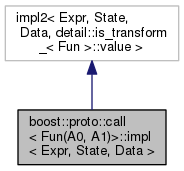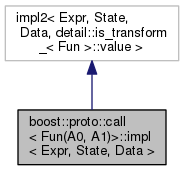Let x be when<_, A0>()(e, s, d) and X be the type of x.
More...
#include <call.hpp>


Let x be when<_, A0>()(e, s, d) and X be the type of x.
Let y be when<_, A1>()(e, s, d) and Y be the type of y. If Fun is a binary PolymorphicFunction object that accepts x and y, then type is a typedef for boost::result_of<Fun(X, Y)>::type. Otherwise, it is a typedef for boost::result_of<Fun(X, Y, Data)>::type. Either call the PolymorphicFunctionObject with 2 arguments: the result of applying the A0 transform, and the result of applying the A1 transform; or invoke the PrimitiveTransform with 3 arguments: the result of applying the A0 transform, the result of applying the A1 transform, and the data.
Let x be when<_, A0>()(e, s, d). Let y be when<_, A1>()(e, s, d). If Fun is a binary PolymorphicFunction object that accepts x and y, return Fun()(x, y). Otherwise, return Fun()(x, y, d).
| e | The current expression |
| s | The current state |
| d | An arbitrary data |